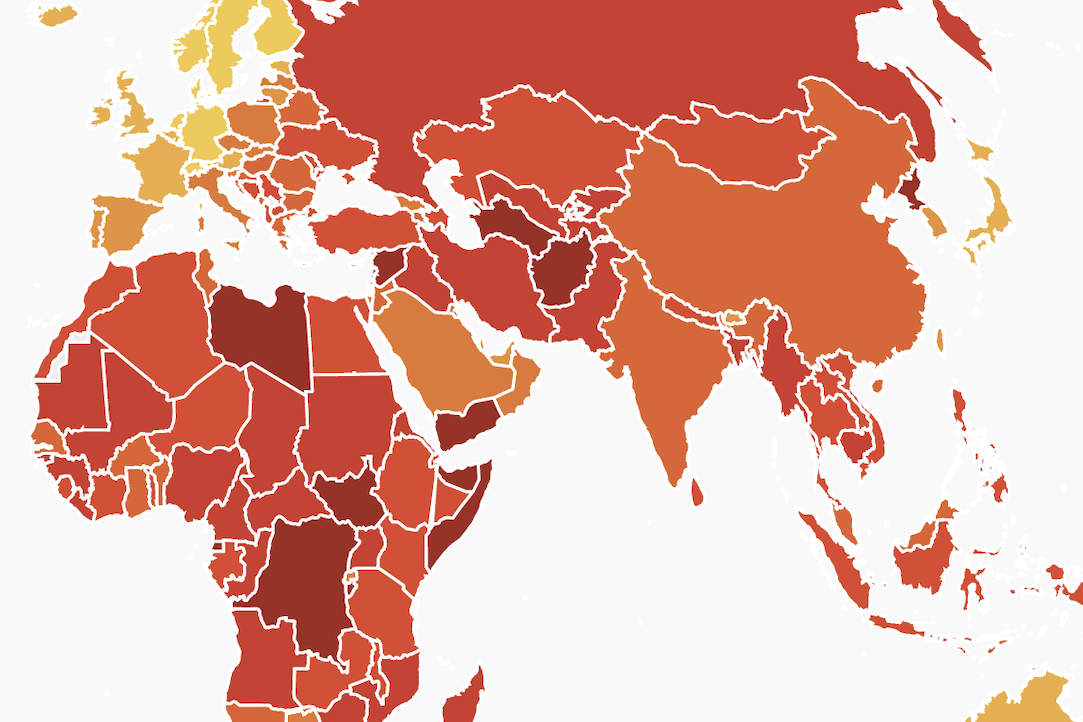
A global measure of corruption is sounding the alarm that not only is the level of bribery and corruption not improving around the world it is worsening in several countries, including in such developed nations as Canada, Austria, and the United Kingdom.
The 2022 Corruption Perceptions Index (CPI), released this month by bribery watchdog Transparency International, shows that most of the world continues to fail to fight corruption. It finds that 95 percent of countries have made little to no progress on fighting corruption since 2017.
Indeed, several have declined on TI’s corruption scale. Since 2017, ten countries significantly declined on their CPI scores. The significant decliners are: Luxembourg (77), Canada (74), the United Kingdom (73), Austria (71), Malaysia (47), Mongolia (33), Pakistan (27), Honduras (23), Nicaragua (19) and Haiti (17). Canada has declined eight points on the index since 2017, while the United Kingdom has fallen nine points. Both are among the biggest decliners during the last five years.
Governments hampered by corruption lack the capacity to protect the people, while public discontent is more likely to turn into violence, said TI in its report. This vicious cycle is impacting countries everywhere from South Sudan (13) to Brazil (38).
“Corruption has made our world a more dangerous place, says Delia Ferreira Rubio, Chair of Transparency International. “As governments have collectively failed to make progress against it, they fuel the current rise in violence and conflict—and endanger people everywhere. The only way out is for states to do the hard work, rooting out corruption at all levels to ensure governments work for all people, not just an elite few.”
Not Much Rotten in Denmark
The CPI ranks 180 countries and territories by their perceived levels of public sector corruption on a scale of zero (highly corrupt) to 100 (very clean). The United States was ranked as the 24th least corrupt country with a 69 on the scale, up 2 clicks from its score in 2021.
The CPI global average remains unchanged at 43 for the eleventh year in a row, and more than two-thirds of countries have a serious problem with corruption, scoring below 50.
- Denmark (90) tops the index this year, with Finland and New Zealand following closely, both at 87. Strong democratic institutions and regard for human rights also make these countries some of the most peaceful in the world according to the Global Peace Index.
- South Sudan (13), Syria (13) and Somalia (12), all of which are embroiled in protracted conflict, remain at the bottom of the CPI.
- 26 countries—among them the United Kingdom (73), Qatar (58) and Guatemala (24)—are all at historic lows this year.
- Eight countries improved on the CPI during that same period: Ireland (77), South Korea (63), Armenia (46), Vietnam (42), the Maldives (40), Moldova (39), Angola (33) and Uzbekistan (31).
Russian Corruption
Corruption, conflict, and security are profoundly intertwined, says Transparency International. The misuse, embezzlement or theft of public funds can deprive the very institutions in charge of protecting citizens, enforcing the rule of law and guarding the peace of the resources they need to fulfill that mandate, it says. Criminal and terrorist groups are often aided by the complicity of corrupt public officials, law enforcement authorities, judges and politicians, which allows them to thrive and operate with impunity.
The Russian invasion of Ukraine in February 2022 was a stark reminder of the threat that corruption and the absence of government accountability pose for global peace and security: kleptocrats in Russia (28) have amassed great fortunes by pledging loyalty to President Vladimir Putin in exchange for profitable government contracts and protection of their economic interests. The absence of any checks on Putin’s power allowed him to pursue his geopolitical ambitions with impunity. According to TI, this attack destabilized the European continent, threatening democracy and killing tens of thousands.
After decades of conflict, South Sudan (13) is in a major humanitarian crisis with more than half of the population facing acute food insecurity—and corruption is exacerbating the situation, notes the bribery watchdog. A Sentry report from last year revealed that a massive fraud scheme by a network of corrupt politicians with ties to the president’s family siphoned off aid for food, fuel and medicine.
“The good news is that leaders can fight corruption and promote peace all at once,” says Daniel Eriksson, Chief Executive Officer of Transparency International. “Governments must open up space to include the public in decision-making – from activists and business owners to marginalized communities and young people. In democratic societies, the people can raise their voices to help root out corruption and demand a safer world for us all.” ![]()
Joseph McCafferty is editor & publisher of Compliance Chief 360°

